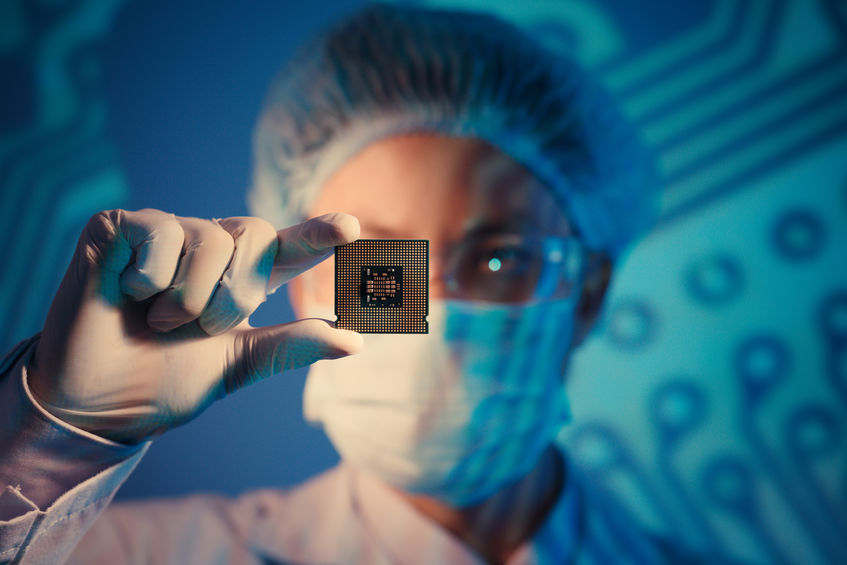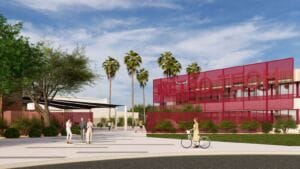• Moov Technologies, an online marketplace that sells used semiconductor manufacturing parts and equipment, has managed to profit during the global chip shortage.
• Originally founded in Silicon Valley, the tech company opened a hub in Chandler, Ariz. in 2019 after co-founder and CEO Steven Zhou connected with Nicholas Meissner, who lived in the Phoenix suburb. Moov doubled down on its Greater Phoenix expansion during the pandemic, where headcount quickly surpassed that of the San Francisco office.
• In the year and a half since first expanding into Arizona, Moov’s revenue has increased by more than 1,000%.
• With almost 90% of its employees already in Greater Phoenix, Moov announced in March 2021 that the company was shifting its headquarters from the Bay Area to Tempe, Ariz.
READ ALSO: Can Metro Phoenix become America’s semiconductor capital?
How Moov grew during the pandemic
With the rapid advancement of technology in recent years, there has been a hyper-demand for devices that require chips and electronics. The manufacturing industry was on its heels trying to keep up.
Costs for parts were increasing due to a shortage, and when the COVID-19 pandemic altered business operations around the world, lead times shot up. Some original equipment manufacturers were backlogged by more than a year. Others halted production completely. With high demand, low supply, the inability of companies to produce parts quickly and policies that in some cases disallowed trade, a global shortage of manufacturing equipment surfaced.
Moov Technologies was perfectly situated to step in as a product provider and connector to those who had equipment with those that needed equipment.
Operating at a time in which new equipment was at a premium coupled with the company’s expansion from San Francisco to Greater Phoenix in 2019 allowed revenue to increase by more than 1,000% over the past year and a half.
“If you are a manufacturing company and either you want to further your production line, you want to expand your capacity, you want to buy a machine for spare parts – maybe you even have a piece of equipment that’s down and it’s holding your production line – you’re not going to wait a year. You’re losing money every day,” Zhou said. “Because of all these dynamics, these companies turned more and more to the second-hand market,” he said.
The shift to Greater Phoenix
In 2019, Zhou reconnected with former colleague Nicholas Meissner, a prominent name in the equipment trade community for the past 12 years. Meissner was living in Chandler and became interested in joining Zhou and Moov, but he didn’t want to relocate to the Bay Area.
Moov continued building in San Francisco while opening a satellite office in Chandler. It quickly became apparent that further movement to Greater Phoenix would facilitate additional growth opportunities.
“When the pandemic hit, we really doubled down on Arizona growth,” Zhou said. “The Arizona office has wildly surpassed the headcount of our San Francisco office, and we’re just pretty much going all-in on Arizona growth.”
The office moved from Chandler to Tempe in September 2020 and internally became known HQ2 — HQ1 being in San Francisco – as headcount multiplied in the region. By March 2021, 80-90% of Moov employees were in Arizona, Zhou said, and it became “very obvious that this is where the business is.”
Operating in Greater Phoenix allowed the company to continue expanding during the COVID-19 pandemic. With such a high degree of its operations located in the region, it became a natural step for the company to turn their Greater Phoenix base into the full-time headquarters. In March 2021, Moov announced that Greater Phoenix had become the new HQ1.
“Being the Silicon Valley shiny new object transplant here definitely has its perks,” Zhou said. “People, their ears perk up, their eyes light up and they’re just being very receptive with us coming over.”
“The potential for growth out here, just in terms of families, businesses in general, as well as the growth opportunity in the semiconductor industry itself, provided a lot more accessibility for us as a company,” said Moov operations manager Lauren Stellwag.
“Arizona’s very attractive to families, it’s very attractive to businesses, and I think that’s one of the big impacting reasons as to why Nicolas Meissner was here in the beginning as well. That has obviously really led to our success as a company here.”
Zhou foresees the region’s business-friendly environment easing their transition to be headquartered solely in Greater Phoenix. Moov is talking with local organizations about incentives, has been introduced to the Greater Phoenix Chamber, worked with GPEC and is in the process of applying for the Quality Jobs Tax Credit Program. As the company gets more firmly situated, it will begin expanding beyond its already-existing network, Zhou said.
There is an expectation of continued and immediate growth. He expects to have about 50 employees by the end of 2021, and then “conservatively” expects employee count to triple or quadruple each year and bring hundreds of jobs to Greater Phoenix over the next several years.
This transition and growth will be eased by the abundance of talent produced at higher education institutions. Arizona State has a campus in Mesa dedicated to focuses including engineering and tech, and its business school has 30 programs ranked in the top 25 of its discipline nationally, the most of any school in the nation. ASU and other local colleges are in contact with Moov, and the company has joined Handshake, a job and recruiting platform that allows college students and recent graduates to create profiles and connect with potential employers.
“ASU has a phenomenal MBA program, so I can definitely see that aiding to us in the future,” Stellwag said. “It’s definitely a fast-growing state and business, and even personal ecosystem, and I’m very bullish about the direction and the momentum that Arizona is seeing and will see in the decade-plus.”
The Greater Phoenix tech hub
Moov joins a community of legacy semiconductor companies including Intel, who just announced a $20 billion investment to build two new fabs at the company’s Ocotillo Campus in Chandler, and NXP Semiconductors to have their base of operations in the Greater Phoenix region.
“It was very obvious, with NXP, Intel, Microchip, all those companies out here, we were already doing business with them, so it was a very natural segue for us,” Zhou said.
With the announcement of TSMC moving to Greater Phoenix, Moov has the ability to connect with an international partner without leaving the city.
“A rising tide lifts all boats,” Zhou said.
Moov is in a unique position as a relocation from Silicon Valley. The network in the Bay Area had both its benefits and drawbacks, he said. There are more companies and investors in Silicon Valley than Arizona, but by definition it’s that much harder to stand out. Greater Phoenix has major players in the tech industry, but it is not oversaturated.
From July 2019 to December 2020, Arizona businesses attracted $1.06 billion in investment activity across 102 financing deals and 247 exits. It’s important to note that only 65 deals had reported funding amounts and the amount of total investment is likely much higher. While Silicon Valley has a large venture base, Arizona is a region that attracts dollars and enables companies to scale.
“Being the Silicon Valley shiny new object transplant here definitely has its perks,” Zhou said. “People, their ears perk up, their eyes light up and they’re just being very receptive with us coming over.”
Moov’s unique operation also helps it stand out in the local manufacturing sector. The website lists more than $1.3 billion in equipment, which aims to reach companies around the world in need of second-hand parts.
“When the pandemic hit, we really doubled down on Arizona growth,” Zhou said. “The Arizona office has wildly surpassed the headcount of our San Francisco office, and we’re just pretty much going all-in on Arizona growth.”
There has been a major increase in the industry’s second-hand equipment sales when a decade ago the used trading market was still young. Now, the second-hand market makes up about 10% of all equipment purchasing.
With that said, Moov’s inventory is still a relatively small amount compared to the overall need of manufacturers. Fabs like Intel and TSMC spend $20 to $30 billion annually, and there are thousands of companies around the world that need billions worth of parts.
“Moov’s mission is to grow that market share and increase the global appetite to consider and buy used equipment for semiconductor manufacturing,” Zhou said.
With innovative ideas, Moov expanded rapidly in Greater Phoenix. The full-time headquarter move helps accelerate their trajectory for continued growth.
“It’s definitely a fast-growing state and business, and even personal ecosystem, and I’m very bullish about the direction and the momentum that Arizona is seeing and will see in the decade-plus,” Zhou said.




